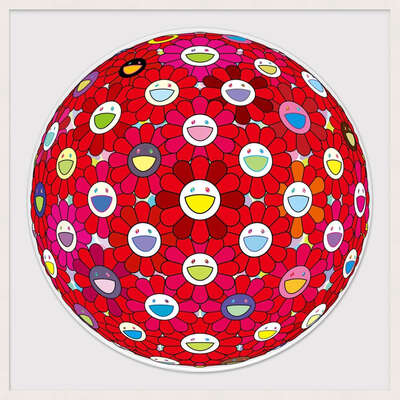

- Exclusive offers
- Inspiring new releases
- Personal invitations to Art Events

Takashi Murakami has firmly established himself in the international art scene with his spectacular and distinctively Japanese aesthetic. Inspired by his homeland’s anime and manga culture, he… Read more
Intro Bio Exhibitions
| 1962 | Born in Tokyo, Japan |
| 1988 | Master of Fine Arts from the Tokyo National University of Fine Arts and Music, Tokyo, Japan |
| 1993 | PhD from the Tokyo National University of Fine Arts and Music, Tokyo, Japan |
| 1998 | Guest Professor at UCLA’s School of Art and Architecture, Los Angeles, USA |
| 2001 | Founded the art production company “Kaikai Kiki” with headquarters in Tokyo, Japan and an office in New York, USA |
| Lives and works in Tokyo, Japan and New York, USA |
| Museum of Modern Art, New York, USA | |
| Pinchuk Art Centre, Kiew, Ukraine | |
| Samsung Museum of Art, Seoul, South Korea | |
| Queensland Museum, Brisbane, Australia | |
| Museum of Fine Arts, Boston, USA | |
| Museum of Contemporary Art, Tokyo, Japan | |
| Bard College Center for Curatorial Studies Museum, New York, USA |
| 2022 | Takashi Murakami: Stepping on the Tail of a Rainbow, The Broad, Los Angeles, USA |
| 2020 | Happy!, NSU Art Museum, Fort Lauderdale, Florida, USA Murakami por Murakami, Instituto Tomie Ohtake, Sao Paulo, Brazil |
| 2019 | Takashi Murakami: GYATEI², Gagosian, Los Angeles, USA |
| 2018 | Under the Radiation Falls, Garage Museum of Contemporary Art, Moscow, Russia Change the Rule!, Gagosian, Hong Kong Takashi Murakami in Wonderland, Perrotin, Shanghai, China HEADS↔HEADS, Perrotin, New York, U.S.A. |
| 2017 | Murakami by Murakami, Astrup Fearnley Museet, Oslo, Norway Takashi Murakami's Superflat Consideration on Contemporary Ceramics, Towada Art Center, Aomori, Japan The Octopus Eats Its Own Leg, Museum of Contemporary Art, Chicago, USA, (Modern Art Museum of Fort Worth, Texas; Vancouver Art Gallery, Canada) Takashi Murakami Lineage of Eccentrics, Museum of Fine Arts, Boston, USA The Deep End of the Universe, Albright-Knox Art Gallery, Buffalo, New York, USA |
| 2016 | Learning the Magic of Paintings, Perrotin, Paris, France |
| 2015 | Murakami, The 500 Arhats, Mori Art Museum, Tokyo, Japan |
| 2014 | In the Land of the Dead, Stepping on the Tail of a Rainbow, Gagosian Gallery, New York, USA |
| Arhat Cycle, Palazzo Reale, Milan, Italy | |
| 2013 | Takashi in Superflat Wonderland, Plateau, Seoul, South Korea |
| Takashi Murakami, Galerie Perrotin, Hong Kong, China | |
| Arhat. Blum & Poe, Los Angeles, USA | |
| 2012 | Flowers and Skulls, Gagosian Gallery, Hong Kong, China |
| Murakami: Ego, Qatar Museums Authority, Doha, Qatar | |
| Takashi Murakami, Gagosian Gallery, London, UK | |
| 2011 | Homage to Yves Klein, Galerie Emmanuel Perrotin, Paris, France |
| 2021 | Hong Kong Exchange, Hong Kong, China |
| 2020 | STARS: Six Contemporary Artists from Japan to the World, Mori Art Museum, Tokyo, Japan |
| 2018 | America Too, Murakami & Abloh, Gagosian Beverly Hills, Beverly Hills, USA |
| 2016 | Superflat Collection: From Shohaku and Rasanjin to Anselm Kiefer, Yokohama |
| Museum of Art, Yokohama, Japan | |
| 2015 | The Mannequin of History: Art After Fabrications of Critique and Culture, Expo 2015 |
| Modena, Modena, Italy | |
| 2014 | G I R L, curated by Pharrell Williams, Galerie Perrotin, Paris, France |
| Takahashi Collection 2014: Mindfulness! Nagoya City Art Museum, Nagoya, Japan | |
| Dirge: Reflections on [Life and] Death, Museum of Contemporary Art, Cleveland, USA | |
| Making Links: 25 Years, SCAI, The Bathhouse, Tokyo, Japan | |
| 2013 | Intellectual Game, Shanghai Xintiandi Culture Festival, Shanghai, China |
| Re: Quest―Japanese Contemporary Art since the 1970s, Museum of Art Seoul, South Korea | |
| Seoul National University, Seoul, South Korea | |
| 2012 | Regarding Warhol. Sixty Artists; Fifty Years, Metropolitan Museum, New York, USA |
| 2011 | Collection Platform 1: Circulation, Pinchuk Art Centre, Kiev, Ukraine |
| The World Belongs to You, Palazzo Grassi, Venice, Italy | |
| 2009 | Sold Out: The Artist in the Age of Pop, Tate Modern, London, UK |